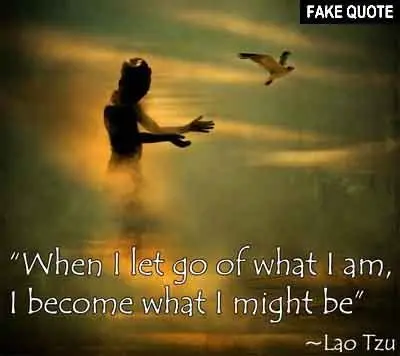|
Tao Te Ching
THE TAOISM OF LAO TZU
|
Fake Lao Tzu Quote"When I let go of what I am..."
This is NOT a quote from Tao Te Ching:"When I let go of what I am, I become what I might be."
This quote is weird not only in the eyes of Lao Tzu, but in those of just about every ancient thinker. They would all agree that I have to be what I am — that's the path worth taking. What I might be is just an illusion, making the mind fool itself. It makes sense in our modern zeitgeist, where everyone from a young age wants to be famous and spectacular. Like in the American credo: you can be anything you want to be. Good luck with that. Lao Tzu, in particular, would sneer at such ambitions. Modesty was his ideal. Returning to the natural way was his recipe. Not chasing some gilded dream that would disappoint even more if it were reached.
On some websites, there is another sentence added to the quote:
Both quotes are from a wildly tendentious version of Tao Te Ching by John Heider: The Tao of Leadership from 1985. It seems to have no intention of being true to the original. The two quotes (page 43) are very loosely based on the first lines of chapter 22 of Tao Te Ching — so loosely that it is hard to comprehend how Heider got to this interpretation. Here is my version of the start of chapter 22:
For more about John Heider and his Tao Te Ching version, see the chapter Silence is a source.
Stefan Stenudd April 2, 2017, revised September 10, 2020.
More Fake Lao Tzu QuotesThere are many more fake Lao Tzu quotes examined on this website. Click the header to see a list of them.
Fake interview with the authorClick the header to read a "fake" interview with Stefan Stenudd, the author of Fake Lao Tzu Quotes.
About CookiesMy Other Websites:I Ching OnlineThe 64 hexagrams of the Chinese classic I Ching and what they mean in divination. Try it online for free.
Qi Energy ExercisesThe ancient Chinese life energy qi (chi) explained, with simple instructions on how to exercise it.
Life EnergyThe many ancient and modern life force beliefs all over the world explained and compared.
Taoismen på svenska
Other Books by Stefan StenuddClick the image to see the book at Amazon (paid link).
The Greek philosophers and what they thought about cosmology, myth, and the gods. |
 Tao Te Ching
Tao Te Ching Now it's a book, too!
Now it's a book, too! Tao Quotes
Tao Quotes Cosmos of the Ancients
Cosmos of the Ancients Qi — Increase Your Life Energy
Qi — Increase Your Life Energy Aikido Principles
Aikido Principles Life Energy Encyclopedia
Life Energy Encyclopedia Archetypes of Mythology
Archetypes of Mythology Stefan Stenudd
Stefan Stenudd